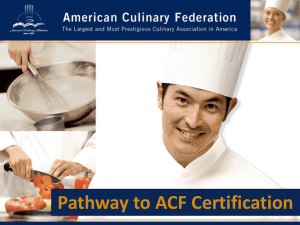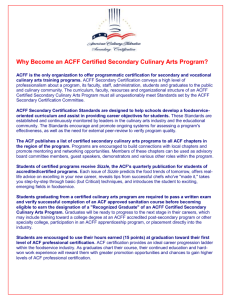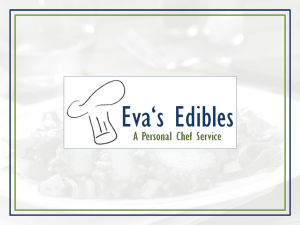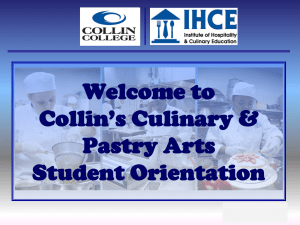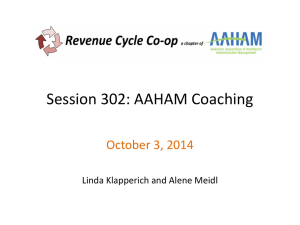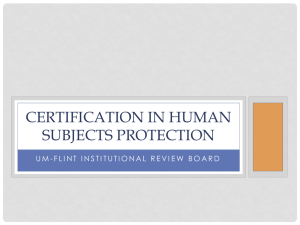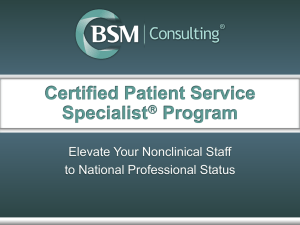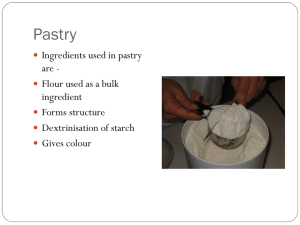certification - American Culinary Federation Inland Empire Chefs
advertisement
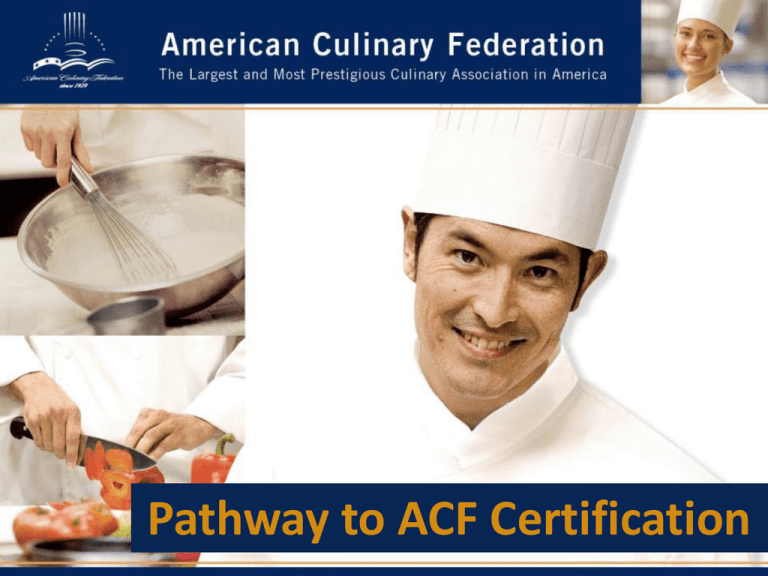
Pathway to ACF Certification Differentiate Yourself With thousands of chefs competing in the job market, it is essential to prove your culinary competency. Certification through the American Culinary Federation demonstrates skill, knowledge and professionalism to the food service industry. ACF Certification Program ACF certification is based on education, work experience and testing. ACF offers 14 certification designations each with specific qualifications. Certifications are open to: – – – – – Cooking Professionals Personal Cooking Professionals Baking and Pastry Professionals Culinary Administrators Culinary Educators Value of Certification To Candidates: With thousands of chefs competing in the job market, certification is essential to prove your culinary competency. Certification through the American Culinary Federation demonstrates skill, knowledge and professionalism to the food service industry and encourages elevation of culinary career path/position. To Employers: Certification shows that a Cook or Chef has reached a benchmark of skills and culinary experience with high standards for food preparation. A knowledge of culinary nutrition, food safety and sanitation and supervisory management has been demonstrated. Certificants are in control of their professional development and career and increased knowledge and motivation is passed on to other staff. To Client/Customer/Public: Certification reassures consumers that the food they eat is prepared to the highest standard. Cooking Professionals • Certified Culinarian® (CC®): An entry level culinarian within a commercial foodservice operation responsible for preparing and cooking sauces, cold food, fish, soups and stocks, meats, vegetables, eggs and other food items. • Certified Sous Chef™ (CSC™): A chef who supervises a shift or station(s) in a foodservice operation. Equivalent job titles are sous chef, banquet chef, garde manger, first cook, a.m. sous chef and p.m. sous chef. • Certified Chef de Cuisine® (CCC®): A chef who is the supervisor in charge of food production in a foodservice operation. This could be a single unit of a multi-unit operation or a free-standing operation. He or she is in essence the chef of the operation with the final decision making power as it relates to culinary operations. Cooking Professionals cont. • Certified Executive Chef® (CEC®): A chef who is the department head usually responsible for all culinary units in a restaurant, hotel, club, hospital or foodservice establishment, or the owner of a foodservice operation. In addition to culinary responsibilities, other duties include budget preparation, payroll, maintenance, controlling food costs and maintaining financial and inventory records. • Certified Master Chef® (CMC®): The consummate chef. A CMC® possesses the highest degree of professional culinary knowledge, skill and mastery of cooking techniques. A separate application is required, in addition to successfully completing an eight-day testing process judged by peers. Certification as a CEC® or CEPC® is a prerequisite. Personal Cooking Professionals • Personal Certified Chef™ (PCC™): A chef who is engaged in the preparation, cooking and serving of foods on a “cook-for-hire” basis. Must also have knowledge of menu planning, marketing, financial management and operational decision making. Has at least three years of cooking experience and one full year of Personal Chef experience. • Personal Certified Executive Chef™ (PCEC™): An advanced chef who is engaged in the preparation, cooking and serving of foods on a “cook-for-hire” basis. Must also have knowledge of menu planning, marketing, financial management and operational decision making. Has at least three years of Personal Chef experience. Baking and Pastry Professionals • Certified Pastry Culinarian® (CPC®): An entry level culinarian within a pastry foodservice operation responsible for the preparation and production of pies, cookies, cakes, breads, rolls, desserts or other baked goods. • Certified Working Pastry Chef® (CWPC®): A pastry chef who supervises a pastry section or shift within a foodservice operation and has considerable responsibility for preparation and production of all pastry items. • Certified Executive Pastry Chef® (CEPC®): A pastry chef who is a department head, usually responsible to the executive chef of a food operation or to the management of a pastry specialty firm. A CEPC® has supervisory responsibility as well as administrative duties. • Certified Master Pastry Chef® (CMPC®): A CMPC® possesses the highest degree of professional knowledge, skill and mastery of cooking techniques as they apply to baking and pastry. A separate application is required, in addition to successfully completing an 8-day testing process judged by peers. Certification as a CEC® or CEPC® is a prerequisite. Culinary Administrators Certified Culinary Administrator™ (CCA™): This is an executive-level chef who is responsible for the administrative functions of running a professional foodservice operation. This culinary professional must demonstrate proficiency in culinary knowledge, human resources, operational management and business planning skills. Culinary Educators •Certified Secondary Culinary Educator® (CSCE®): An advanced-degree culinary professional who is working as an educator at an accredited secondary or vocational institution. A CSCE® is responsible for the development, implementation, administration, evaluation and maintenance of a culinary arts or foodservice management curriculum. In addition, a CSCE® demonstrates the culinary competencies of a CCC® or CWPC® during a Practical Exam. •Certified Culinary Educator™ (CCE™): An advanced-degree culinary professional, with industry experience, working as an educator in an accredited postsecondary institution or military training facility. A CCE™ is responsible for the development, implementation, administration, evaluation and maintenance of a culinary arts or foodservice management curriculum. In addition, a CCE™ demonstrates the culinary competencies of a CCC® or CWPC® during a Practical Exam. Certification Process As easy as 1, 2, 3! Step 1: Determine Eligibility Eligibility is based on a chefs work experience and educational background. • • • Documentation of work history – A candidate’s eligible work history is limited to the past 10 years. Documentation of education and continuing education hours (CEHs). – A candidate can take a variety of educational paths to meet the education requirement. Hours earned for mandatory courses and/or refreshers can be counted towards hours required for continuing education. Completion of mandatory education courses – Candidates should provide documentation of three 30-hour courses—one in Nutrition, one in Food Safety and Sanitation, and one in Supervisory Management. – If these courses were taken more than five years ago, an eight hour refresher course is required in each topic. These courses are available online at Chefcertification.com or may be taken at a school or another authorized source. Step 2: Complete the Initial Pre-Approval Application Complete the application and include the necessary documentation. • Educational documents may be copies of diplomas, transcripts, certificates of completion (including date and hours), etc. • Experience documentation may be employment documentation forms or letters from past or present employers on company letterhead. If not available, copies of tax records or W-2 stating time frame of work are acceptable in conjunction with validated letters from former culinary peers attesting to your employment, job title, duties and number of employees managed. • Mandatory education course certificates should be included in application. Certificates should include course title, completion date and number of hours earned. • Submit application and documentation of completed requirements to ACF for preapproval. American Culinary Federation 180 Center Place Way St. Augustine, FL 32095 Fax: 904-940-0742 Email/scan: certify@acfchefs.net Estimated Cost of Certification Pre-Approval and Final Application Fee • Candidates interested in obtaining their certification will pay a $50.00 non refundable initial application fee. This fee is deducted from the certification fee. The remainder of the certification fee is due at time of final application. Cost Estimate Initial Certification ACF: Notification of Eligibility The ACF Certification Department will review applications and documentation (i.e., dates of completion, work history and mandatory course work). Once the candidate’s application is approved he or she will be approved to take the written and practical exam. Testing documentation will be needed for final certification approval. Only after ACF approval may a candidate register for the written or practical exam. Step 3: Certification Examinations There are two exams required for certification. – The written exam tests culinary knowledge. – The practical exam evaluates skill proficiency. Written Exams for ACF Certification ACF written exams are administered by Comira. •Comira is a full-service, customer-focused testing provider with over 500 testing centers nationwide. You can register for the exam near you by calling (800) 947-4228, option 4, Mon.–Fri. 6 a.m.–5 p.m. Pacific time, Sat. 8 a.m.–noon Pacific time, or you can register 24/7 at the ACF/Comira Online Registration Site. • The written exam fee is $75 and is paid directly to Comira. •An ACF number is required at time of registration. To request an ACF identification number contact certify@acfchefs.net prior to registration. •Written exam scores are valid for two years. Practical Exams for ACF Certification When you are ready to take the practical exam for your ACF certification, complete the Practical Exam Candidate Registration Form and return to the ACF national office. The test fee due to ACF is $50 for ACF members and $100 for non-members. Payment must be made prior to the exam date. • You must contact the test administration to confirm test time, host site fee and specific details about the testing facility. • Test sites may charge an additional host site fee that is payable to the organization hosting the exam. • Payment for any host site fees are separate from the amount due to ACF and are coordinated by the test site administrator. How to prepare for exams: Written Exam • The ACF offers a list of recommended reference materials, relevant to each certification level as well as practice exams which can be purchased on eCulinary. Practical Exam • Practice, practice, practice • Review practical exam manual • Practice, practice, practice Step 4: Final Application Upon successful completion of the written and practical exam, submit final application along with appropriate documentation: written and practical exam passing forms along with remaining certification fee. Include all back-up documentation, no originals (copies only). Mandatory education courses (i.e., nutrition, sanitation and safety and supervisory management) must be current at time of final application; if not a refresher course maybe required before certification is finalized and approved. ACF: Approval Process Official & Announcement of Certification The ACF Certification Department will review final application, exam documentation and will notify candidates of approval. – Please allow 2–3 weeks for processing – You will be notified by email that application is received. – Once certification is approved your certification letter with wallet card and certificate will be mailed. Certifications are valid for five years. For more information, call us at (800) 624-9458,or mail us at certify@acfchefs.net. Recertification Recertification is required every five years to remain current with present-day trends in the culinary industry. To maintain your certification: Fill out a recertification application Include payment with application Provide the necessary documentation for your Continuing Education Hours (CEHs). CEHs are experiences that assist in the development or enhancement of the knowledge and skills directly related to the individual’s professional occupation. On your first recertification: • You are required to take 8-hour refresher courses for Food Safety and Sanitation, Nutrition, and Culinary Supervisory Management as part of your 80 CEHs. On your second or subsequent recertifications: • You are only required to complete an 8-hour refresher in Food Safety and Sanitation as part of your 80 CEHs. CEH Requirement for Multiple Certification Designations • Example: Chef Jones currently holds a CEC, CCE, CCA. When she is ready for recertification, she will need to complete 80 for her first certification, CEC, then 40 for her second, CCE, and 20 for her third, CCA, which will total 140 continuing education hours). Certification Upgrade Candidates are welcome to upgrade their ACF certification to a higher level at any time. Call (800) 624-9458, ext. 130, or email ACF at certify@acfchefs.net for assistance. American Culinary Federation 180 Center Place Way, St. Augustine, FL 32095 www.acfchefs.org
